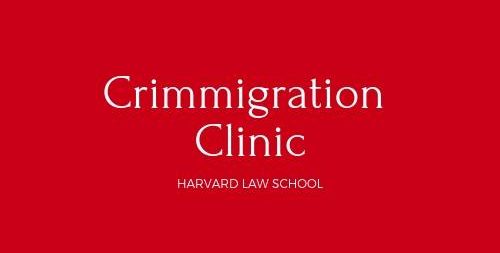
This post was written by Crimmigration Clinic summer intern Megan Nally. She is a rising senior at Wesleyan University studying Government and Hispanic Literatures and Cultures with a certificate in International Relations
On July 6, the Crimmigration Clinic submitted a brief of amicus curiae on behalf of leading constitutional and immigration law professors in support of a petition for rehearing and rehearing en banc. The petition requests that the U.S. Court of Appeals for the First Circuit reverse its prior decision relying on the flawed Boston Regional Intelligence Center’s (“BRIC”) gang database to affirm the deportation of a young Latino Boston resident. In support of the petition, the clinic’s brief argues that the Immigration Judge’s heavy reliance on the unreliable Gang Assessment Database violates the Fifth Amendment’s Due Process Clause.
BRIC’s Gang Assessment Database has become a dangerous tool of the Boston Police Department (“BPD”) to track and label individuals suspected of gang association or membership with little to no evidence. Although the database is not public, a 2018 lawsuit filed by the ACLU of Massachusetts demanded a full analysis of gang activity in Boston, which estimated around 160 documented gangs and 5,300 individuals. These strikingly high numbers can be attributed to the Gang Assessment Database’s alarming point system that confines individuals into stereotyped categories based on their clothing, tattoos, acquaintances, and classmates, among other things. Points are logged during field interrogation observations by police officers, where an individual is identified, observed, and added to or altered in the database without their knowledge. This observation-only system raises serious concerns about racial profiling. As of January 2019, the racial and gender breakdown of listed individuals was 66.4% black non-Hispanic, 14.1% white Hispanic, 9.7% black Hispanic, 2.3 % white non-Hispanic, 0.4% Asian, and 99.5% male. These statistics highlight an overwhelmingly disproportionate number of males of color and suggest that database methods are based in stereotypes that criminalize lawful behavior.
The recent amicus brief filed by the Crimmigration Clinic highlights the many flaws of the database, specifically how the use of the database in immigration proceedings violates due process. The law requires that noncitizens in immigration proceedings are provided a “full and fair hearing” in which they may present new evidence and rebut evidence against them. The gang database, however, provides no such mechanism for rebuttal; individuals listed in the Gang Assessment Database are not able to challenge gang allegations or their designation as a gang member.
This specific brief supports of the case of a young man, James*, who fled El Salvador in 2015 in fear of religious persecution. While he was living in Boston, the Department of Homeland Security (“DHS”) wrongfully labelled James as a VERIFIED and ACTIVE member of the MS-13 gang based on information in the Gang Assessment Database that focused exclusively on associations with fellow community members. Shortly after, in 2018, James was arrested and detained by Immigration and Customs Enforcement (“ICE”). He then applied for asylum, withholding of removal, and protection under Article 3 of the United Nations Convention Against Torture, but the unproven allegations of gang membership in the Gang Assessment Database had detrimental consequences. In his asylum claim, James emphasized an ever-present fear of returning to El Salvador due to threats from the MS-13 gang. The claim was ultimately denied because the Immigration Judge found that his inclusion in the Gang Assessment Database discredited any reasonable fear he may have to return.
Unfortunately, this type of gang database is not unique to Boston. However, other states have made changes to prevent situations like that of James. For example, California recently passed a law to provide safeguards to its gang database, including a review and appeal process and prohibiting the information to be shared with DHS. Boston’s gang database has no protections whatsoever and largely targets young Boston Latino residents. The consequence for many has been deportation based on unproven gang allegations.
If Boston has any hopes of becoming a sanctuary city, this harmful system and practice must be dismantled. At the very least, we hope our amicus brief will help convince the First Circuit that the reliance on Boston’s gang database in removal proceedings violates due process.
*Client’s name has been changed to respect client confidentiality.